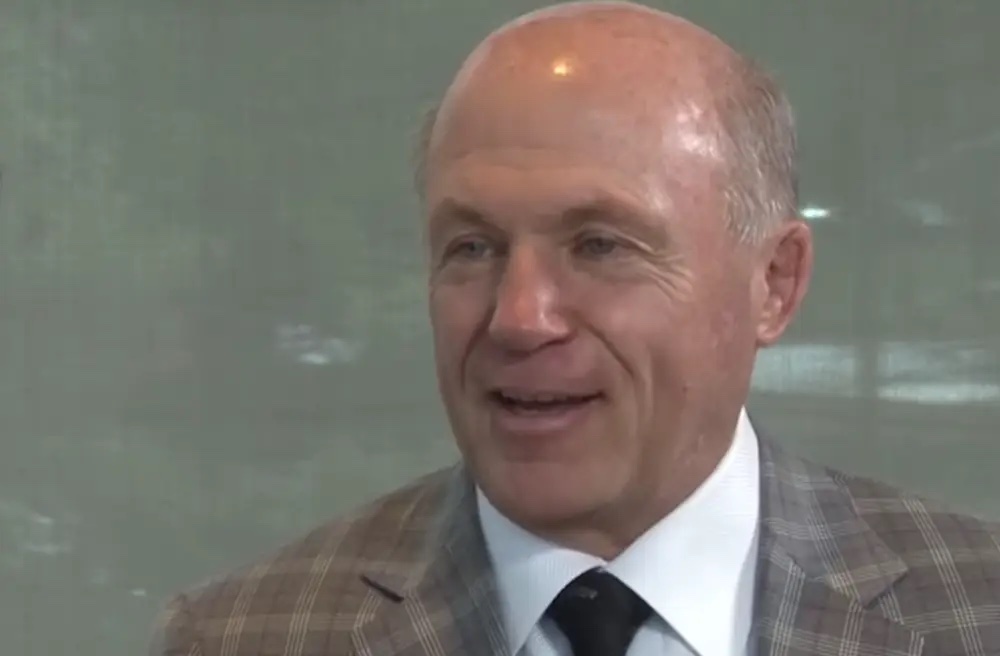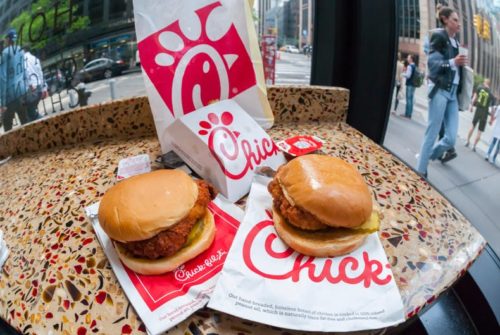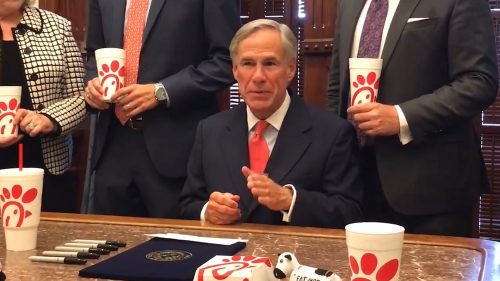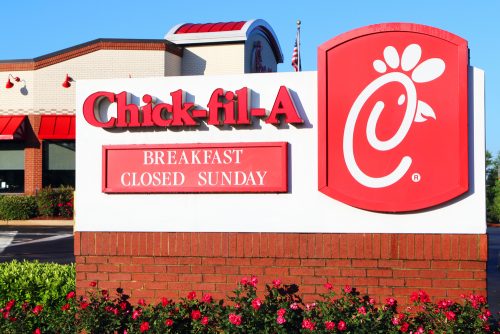Chick-fil-A’s troubled relationship with the LGBTQ+ community
Chick-fil-A is one of the top 10 largest fast-food chains in the U.S. with a widely loved offering of chicken sandwiches and an estimated 2022 revenue of $6.4 billion, according to Zippia.com. However, the company has also had a long history of supporting anti-LGBTQ+ causes.
Here’s an overview of its queerphobic actions and how social pressure has caused the company to shift its attention away from anti-LGBTQ+ efforts in recent years.
A history of Chick-fil-A’s controversial actions
Since 2003, the WinShape Foundation, a charity co-founded by Chick-fil-A’s now-deceased founder S. Truett Cathy and his wife Jeanette Cathy, has donated over $1 million to groups that actively oppose same-sex marriage, including Phyllis Schlafly’s Eagle Forum; the anti-LGBTQ Christian group Focus on the Family; the SLPC-certified hate group Family Research Council; the now-defunct ex-gay therapy group Exodus International; the exclusively for-heterosexuals-only Marriage & Family Legacy Fund; and the Fellowship of Christian Athletes (FCA), a religious groups whose “sexual purity policy” prohibits any homosexual acts.
In 2009, Chick Fil-a doubled that amount to $2 million. In January 2011, Chick-fil-A co-sponsored a marriage conference with the Pennsylvania Family Institute, a group that opposes expanded LGBTQ+ civil rights. In 2012, Chick-fil-A executives promised to stop supporting anti-LGBTQ organizations.
However, The Chick-fil-A Foundation’s IRS filings from 2015 revealed that the foundation donated $1 million to the FCA; $200,000 to the Paul Anderson Youth Home, a Georgia-based residential home for troubled youth which said that child abuse causes homosexuality; and $130,000 to the Salvation Army, a religious international charity that has long opposed same-sex marriage and anti-LGBTQ housing discrimination protectionswhile supporting religious exemptions from LGBTQ+ anti-discrimination laws. In 2017, Chick-fil-A’s donations to these groups equaled nearly $2 million.
Dan Cathy’s statements against same-sex marriage

In 2012, Chick fil-A’s then-president and chief operating officer Dan Cathy made repeated comments against same-sex marriage. On June 16, 2012, Cathy said on The Ken Coleman Show that the United States was “inviting God’s judgment” upon it by redefining marriage to include same-sex spouses. “I pray God’s mercy on our generation that has such a prideful, arrogant attitude to think that we have the audacity to define what marriage is about,” Cathy said.
In a July 2, 2012 interview with Biblical Recorder, Dan Cathy said he was “guilty as charged”when asked about Chick-fil-A’s “support of the traditional family.” In June 2013, the day the U.S. Supreme Court struck down Section 3 of the so-called Defense of Marriage Act (DOMA), Cathy tweeted (and quickly deleted), “Sad day for our nation; founding fathers would be ashamed of our gen. to abandon wisdom of the ages re: cornerstone of strong societies.”
By 2014, Cathy said it was a “mistake” to involve his company in the public debate against same-sex marriage. Nevertheless, even into 2021, Cathy — who still serves as the company’s chairman — continued using his money to fund the National Christian Charitable Foundation and its “dark money operations” supporting anti-LGBTQ+ legislation.
Chick-fil-A’s corporate policies and employee treatment

Chick-fil-A’s current statement on Diversity, Equity and Inclusion (DEI) says that the company doesn’t allow employment discrimination or harassment based on “sexual orientation, gender, gender identity, gender expression,” or other personal characteristics, like religion.
Despite this, in 2002, a Muslim employee of a Houston location sued the chain, alleging that he had been fired for refusing to pray to Jesus with other employees — the company settled the suit out of court. In 2022, a transgender female Chick-fil-A employee sued the restaurant chain after her co-worker allegedly began making violent, racist, and queerphobic threats.
LGBTQ+ Chick-fil-A employees have variously spoken out for and against the company. One anonymous gay worker discouraged boycotts, noting that they would mostly harm the chain’s LGBTQ+ employees, but also accused the restaurant’s anti-gay and Christian supporters of being self-righteous, arrogant, and blind to LGBTQ+ suffering.
Several gay employees said some customers offered homophobic words of support for the business while other people yelled at employees for supporting a homophobic company. Others said that their Chick-fil-A co-workers and supervisors didn’t tolerate homophobic behavior from colleagues.
In May 2023, one of Chick-fil-A’s Instagram posts went viral for honoring an employee who seemed possibly queer. The same month, right-wingers threatened to boycott the companyfor allegedly “going woke” after it hired a new vice president of DEI. Around the same time, right-wingers also accused the company of being “woke” after a 2020 video resurfaced of Dan Cathy denouncing racism.
Chick-fil-A’s philanthropy shifts show the power of consumer advocacy

Chick-fil-A’s supporters have encouraged the company to embrace its anti-gay social stances, while its critics have urged the company to turn away from its anti-LGBTQ+ practices.
In 2012, gay activists and allies staged a national boycott of the chain after one location donated food to a seminar hosted by the anti-gay Pennsylvania Family Institute. To combat the boycotts, former Arkansas Gov. Mike Huckabee (R) declared August 1, 2012 as Chick-fil-A Appreciation Day.
In support of the day, Huckabee wrote, “Let’s affirm a business that operates on Christian principles and whose executives are willing to take a stand for the godly values we espouse…. Too often, those on the left make corporate statements to show support for same-sex marriage, abortion, or profanity, but if Christians affirm traditional values, we’re considered homophobic, fundamentalists, hate-mongers, and intolerant.”
The chain said the day’s resulting sales helped set a record for profits.
On August 3, 2012, however, gay rights activists around the nation held kiss-in protests in opposition to the restaurant’s anti-LGBTQ+ donations and Dan Cathy’s views against same-sex marriage. Some of the protests occurred inside and outside of the restaurants. Other LGBTQ+ allies encouraged people to donate money that they would’ve spent at the restaurant to queer organizations like GLAAD.
Around the same time, gay artist Manny Castro spray-painted a Torrance, California Chick-fil-A restaurant with a picture of a cow and the words “Tastes Like Hate” in protest of Cathy’s anti-gay statements.
Chick-fil-A announced in 2017 that that would be the last year in which it would donate to the Paul Anderson Youth Home. In a November 18, 2019 interview, Chick-fil-A president Tim Tassopoulos said the company would no longer donate to the FCA and The Salvation Army. Tassopoulos also said Chick-fil-A would continue to donate to “faith-based [and] non-faith-based” groups.
In response to Tassopoulos’s announcement, the Christian consumer organization 2nd Vote denounced and boycotted Chick-fil-A for pledging not to donate to anti-LGBTQ+ organizations. The American Family Association also circulated a petition which stated, “It looks like you (Chick-fil-A) are abandoning Christian values and agreeing with homosexual activists who say believing the Bible makes you a hater. Please clarify that you still hold to biblical teachings regarding human sexuality, marriage, and family, and reinstate these Christian ministries.”
In a statement released in 2020, the Chick-fil-A Foundation announced that it would donate $9 million equally to promote youth education through Junior Achievement USA, combat youth homelessness via the LGBTQ+-inclusive charity Covenant House International, and fight hunger by giving to local food banks in cities where it opened new locations.
The anti-LGBTQ+ Family Research Council (FRC) criticized Chick-fil-A for publicly withdrawing its support from the FCA and Salvation Army and announcing its support for Covenant House International, something the FRC called “an endorsement of an LGBT agenda.”
Assessing Chick-fil-A’s progress & its potential for change

While Chick-fil-A’s donation strategy has changed for the time being, it still carries an image of being anti-gay. This image has led city airports and college campuses to protest the openings of new Chick-fil-A restaurants. In response, conservative politicians have continued to defend the company’s Christian beliefs.
Apart from rehabbing its public image, the company could do more to welcome its own LGBTQ+ employees.
In 2019, the LGBTQ+ rights organization the Human Rights Campaign (HRC) and the queer media watchdog group GLAAD both said that they wanted Chick-fil-A to implement fair hiring practices, transparency about donations, and proof that Chick-fil-A has actually stopped donating to anti-LGBTQ+ organizations.
The company could certainly do more to become more LGBTQ+-inclusive. The company has never participated in the HRC’s Corporate Equality Index measuring the company’s own queer-inclusive workplace policies. The company also has no internal employee resource groups for addressing the needs of LGBTQ+-identified team members. It’s unclear if the company offers LGBTQ+-inclusive anti-discrimination training or equal employee benefits, like parental leave and domestic partner benefits, regardless of workers’ sexual orientations or gender identities.
Other businesses have contrasted themselves with Chick-fil-A to highlight their own inclusive business practices and the importance of informed consumption and supporting LGBTQ+-friendly businesses.
In June 2021, for instance, Burger King launched the Ch’King sandwich, which closely resembled Chick-fil-A’s trademark chicken sandwich. In a June 3, 2021 tweet, Burger King wrote, “The #ChKing says LGBTQ+ rights!” It also announced that it would donate 40₵ to the HRC for every Ch’King sandwich sold (with a maximum donation of $250,000).
Burger King has previously held LGBTQ+-inclusive marketing campaigns, including the sale of a “Pride Whopper,” a 2017 anti-bullying video, a 2019 ad featuring a same-sex marriage, and a 2020 ad showing the Burger King kissing his fast-food rival Ronald McDonald.
In September 2022, Alexandre’s Bar in the Dallas gayborhood of Oak Lawn announced the sale of its own “Chick-fil-gAy” sandwich that was only available on Sundays (the day on which all Chick-fil-A locations are closed).
Recent polling shows that 70% of non-LGBTQ+ Americans believe that companies should publicly support the queer community through inclusive policies, advertising, and sponsorships — this belief held especially true for younger consumers. In short, Chick-fil-A could invest in its future by continuing to distance itself from its past anti-gay actions.
Diversity is delicious, homophobia is not
Chick-fil-A has given to groups that oppose LGBTQ+ identities and civil rights. Its current chairman, Dan Cathy, has also made several statements against same-sex marriage. This has tarnished the company’s image, even as it has gradually distanced itself from these positions.
While the company remains very successful, its recent changes in donation and anti-discrimination policies show the impact that consumers have made by advocating for LGBTQ+ rights and supporting inclusive business practices. LGBTQ+ people and allies support and remain loyal to companies that support their queer employees and the larger queer community. It pays to research and patronize such supportive businesses so we can all put our money where our mouths are.